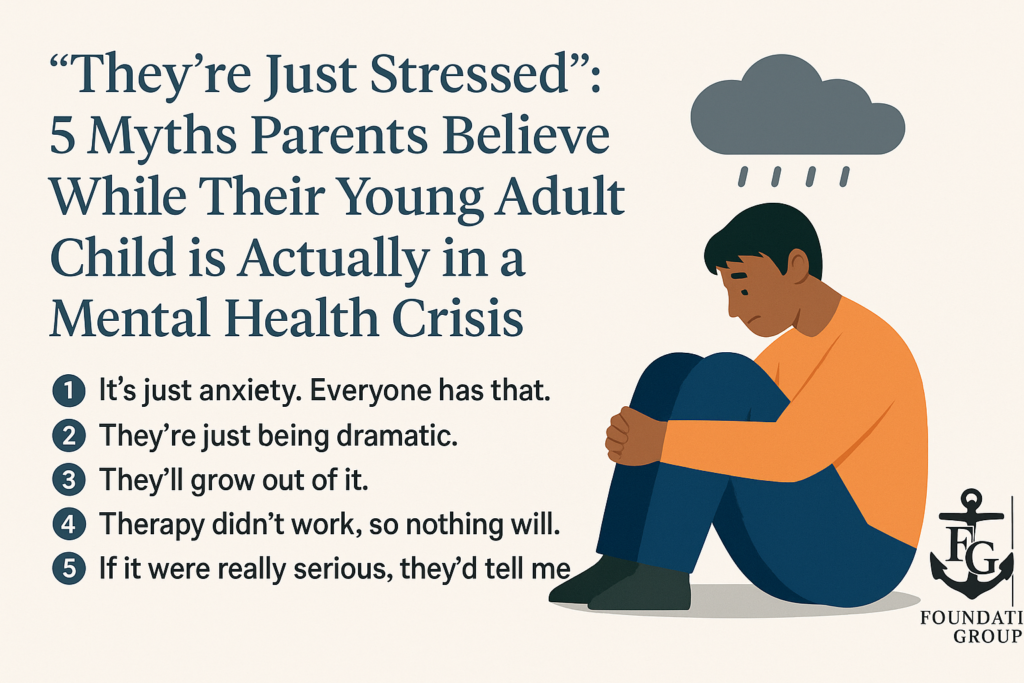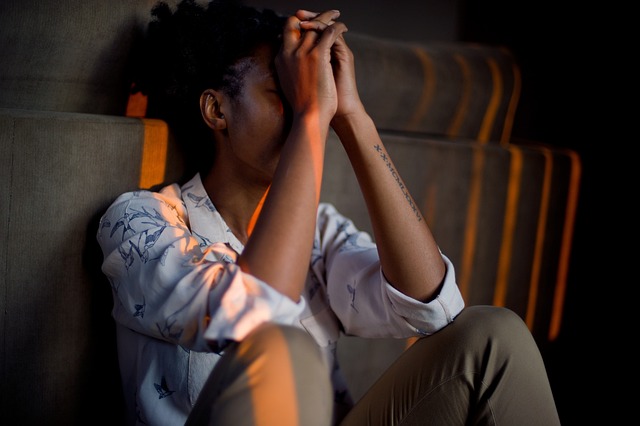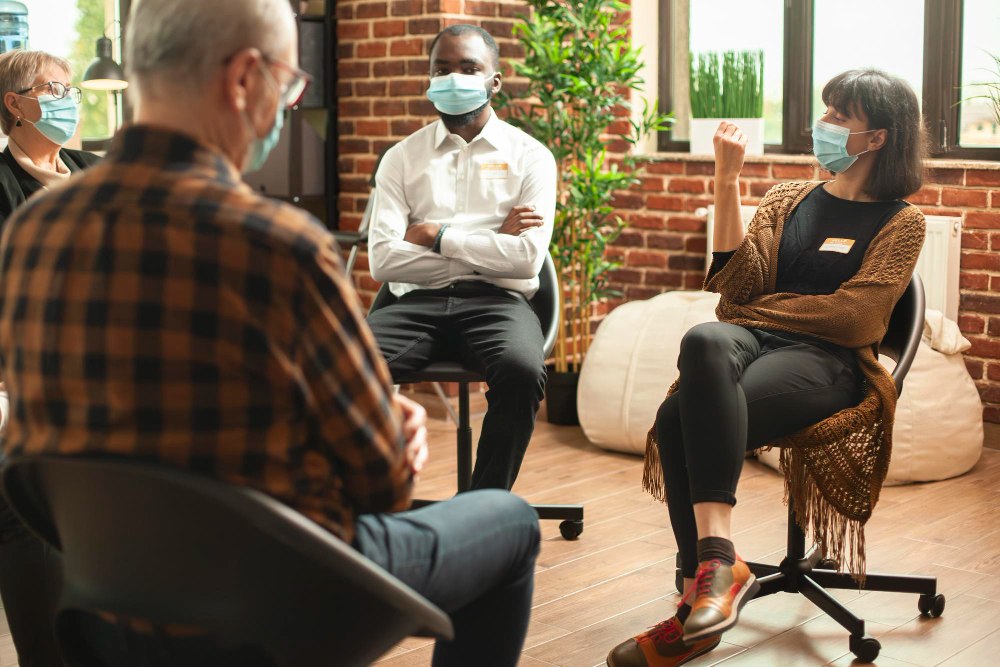You’ve watched your child grow up. You know their moods, their baseline, their habits. But lately, something feels… different. Their texts are shorter. Their sleep is off. Maybe they’ve stopped going to class or work. You keep telling yourself, “They’re just overwhelmed,” or “This is what being 20 looks like.”
But somewhere deep down, another voice whispers: This is more than stress. Something is wrong.
For many parents, that instinct is right—but the cultural myths surrounding young adult mental health can muddy the waters. Let’s walk through the five most common myths that delay care, increase suffering, and block parents from seeing what their child might not be able to say.
Myth 1: “It’s just anxiety. Everyone has that.”
Truth: Anxiety is common—but not all anxiety is manageable without treatment.
It’s true that anxiety is a normal part of life. But when your child is pacing at 3 a.m., avoiding social interaction, catastrophizing every minor decision, or experiencing full-blown panic attacks—this isn’t typical. Anxiety disorders often show up in late adolescence and early adulthood. And they’re not about being “too sensitive” or needing to toughen up.
Without care, anxiety can morph into agoraphobia, depression, substance use, or even suicidal ideation. Catching it early with the right level of support—like a partial hospitalization program (PHP)—can prevent that cascade.
Myth 2: “They’re just being dramatic.”
Truth: What looks like overreaction is often unmanaged emotional pain.
You might hear them yelling one minute and isolating the next. Maybe they cry when they’re told “no” or respond with silence for days. It’s easy to chalk it up to immaturity or emotional theatrics.
But emotional dysregulation is often a symptom—especially of mood disorders, trauma, or underlying neurodivergence. Young adults may not have the language, tools, or self-awareness to name what’s happening inside. Dismissing it as “drama” not only invalidates their struggle but may reinforce the very shame that keeps them from opening up.
Validation doesn’t mean agreeing with every reaction. It means noticing the pain beneath it—and getting curious instead of critical.
Myth 3: “They’ll grow out of it.”
Truth: Waiting it out can make things worse, not better.
Yes, many young adults go through turbulent phases. But many psychiatric disorders also begin in the late teens and early twenties. Depression, bipolar disorder, eating disorders, and psychosis don’t often resolve on their own—and untreated symptoms can harden into habits, deepen in severity, and limit functioning over time.
Delaying care in the hope they’ll “mature out of it” can allow the problem to escalate into crisis. Getting the right help now, even if it feels early, can spare your child—and your family—years of hardship.
Myth 4: “Therapy didn’t work, so nothing will.”
Truth: Not all therapy is the same—and a higher level of care may be what’s needed.
Maybe your child had a few sessions with a school counselor or met once with a therapist who wasn’t a good fit. That doesn’t mean treatment isn’t right—it means that treatment wasn’t the right match.
PHPs offer a different model: daily structure, multiple therapeutic approaches, medication support if needed, and a team that works together. It’s more comprehensive than once-a-week sessions, but less intensive than hospitalization. It also helps stabilize symptoms while your child is still living at home or in the community—a powerful bridge between crisis and independence.
Learn more about our psychiatric day treatment program in Massachusetts.
Myth 5: “If it were really serious, they’d tell me.”
Truth: Silence doesn’t mean safety.
Many young adults struggle to talk about mental health—especially with their parents. They may fear being a burden. Or think they’ll be judged, punished, or dismissed. And some are so deep in depression, anxiety, or disassociation that they can’t name what they’re experiencing.

What they may say instead is, “I’m fine.” What they may show is skipped classes, lost weight, sleep changes, irritability, or unexplained health issues.
Trust what you see. Your concern isn’t a failure—it’s often the first step in getting them real help.
PHP: A Non-Emergency Option for Serious Struggles
Many parents think of treatment as a last resort—as something that happens only after hospitalization or self-harm. But that’s where partial hospitalization programs (PHPs) come in.
PHP is a short-term, intensive level of care designed for young adults who are struggling but still able to live at home. It includes daily therapy, psychiatric oversight, and support with emotion regulation, communication, and life skills. It helps your child stabilize and strengthen their coping tools—without needing inpatient admission.
FAQ: Mental Health Crisis in Young Adults
How do I know if it’s a mental health crisis or normal stress?
Look at function, not just feelings. If your child can no longer manage daily life—eating, sleeping, attending school or work—it’s time to get help. Even if they say “I’m just tired,” take changes seriously.
What’s the difference between PHP and inpatient treatment?
Inpatient is for safety stabilization—like active suicidal ideation or psychosis. PHP is a step down, offering structured care without overnight stays. It’s often ideal for teens and young adults whose symptoms are worsening but don’t require 24/7 monitoring.
My child won’t agree to treatment. What can I do?
You can still reach out. Call a provider and describe the situation. Many programs will coach you on next steps, including how to talk to your child and what signs to watch. Early action can prevent crisis—even if your child isn’t ready yet.
What does a typical day in PHP look like?
Most PHPs run 5–6 hours a day, Monday through Friday. The day includes group therapy, individual sessions, psychiatry check-ins, skills training, and therapeutic activities. It’s structured, supportive, and adapted for each person’s needs.
You Are Not Alone in This
Watching your child unravel is terrifying. But you don’t have to wait for rock bottom—or figure it out alone. Getting help isn’t giving up. It’s showing up.
Let’s talk about what your child needs now. And how to make that next step feel doable—not drastic.
📞 Let’s Talk About What You’re Seeing
If your young adult child is struggling and you’re unsure what comes next, our team is here to help.
Call us at (888) 685-9730.
We’ll listen—without judgment—and help you understand your options, including our PHP and other care pathways.








